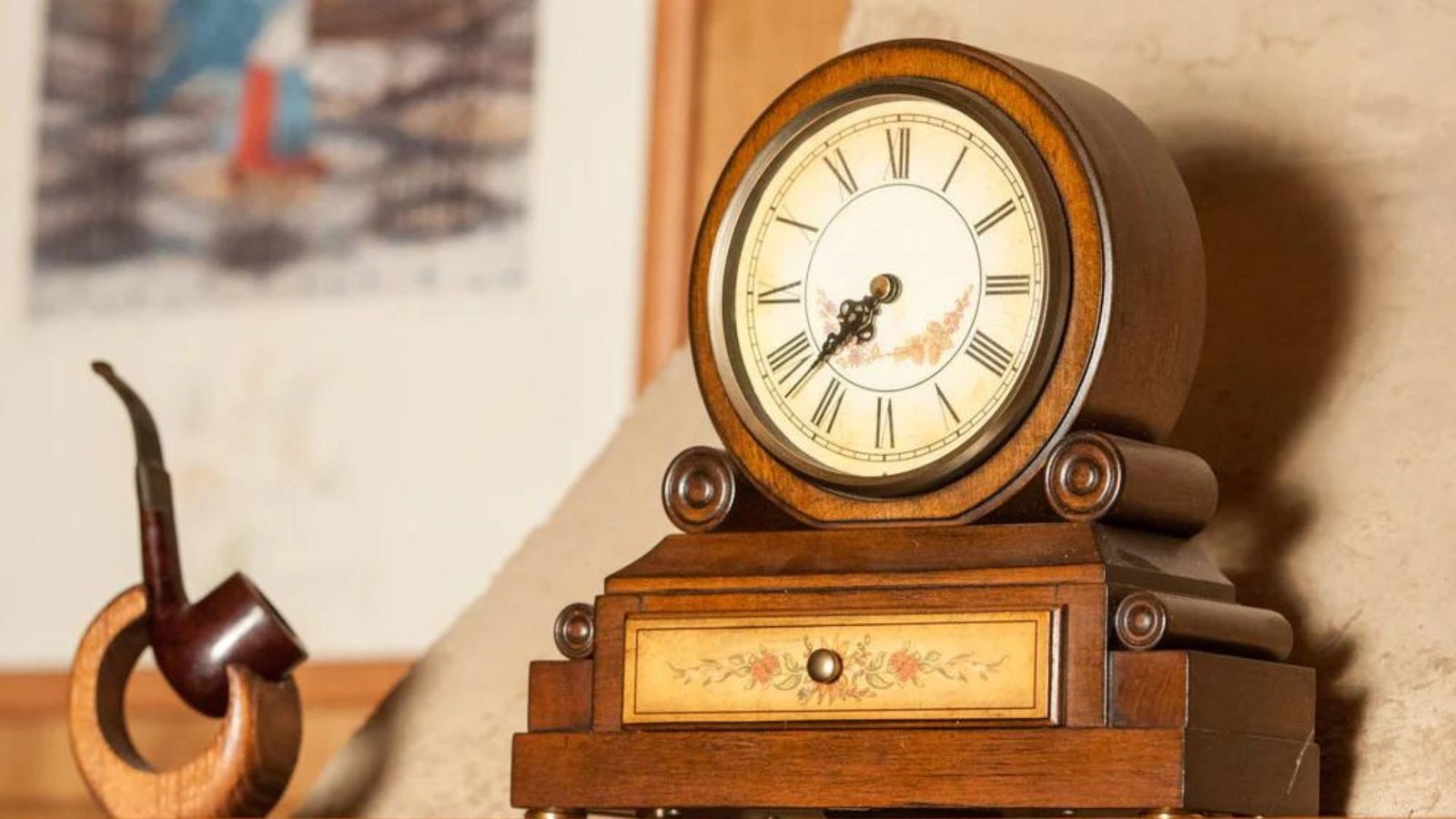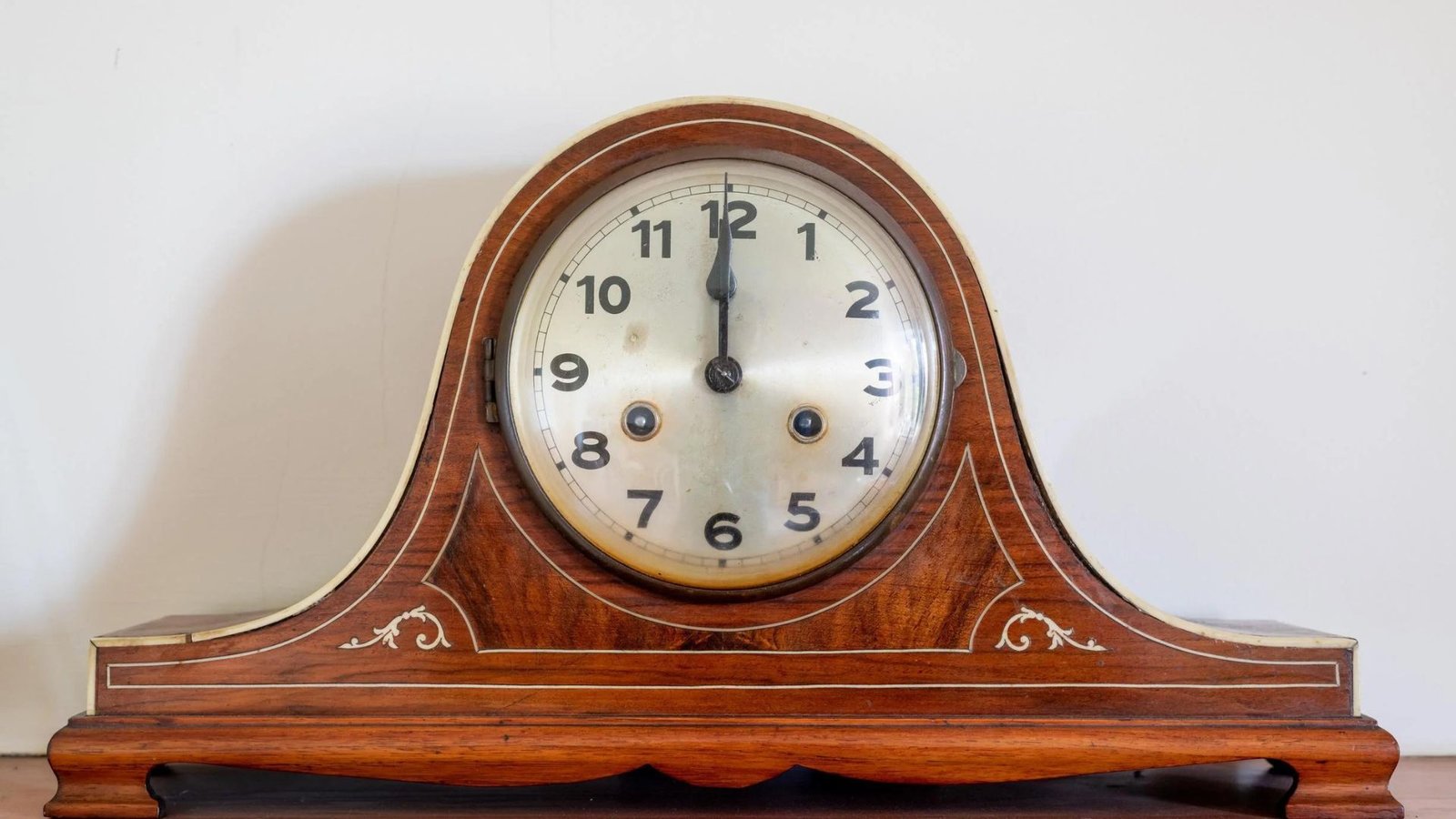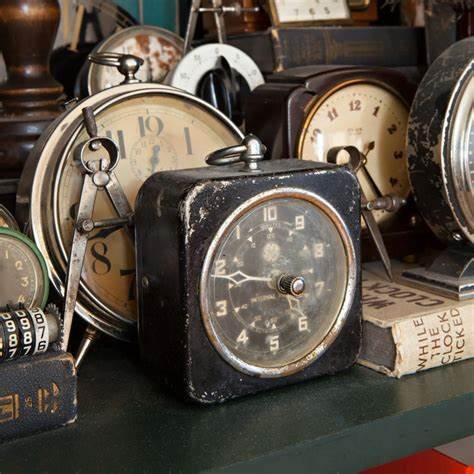Antique clocks are more than just timepieces—they’re historical artifacts that require special attention and care to preserve their beauty and functionality. Proper care can extend the life of these treasures, keeping them ticking for generations. Here’s a guide on how to care for and preserve antique clocks effectively.

Regular Cleaning
Dust and dirt can accumulate in the mechanisms and on the exterior of antique clocks, causing wear over time.
- Dusting: Use a soft, lint-free cloth to gently wipe down the surface of the clock. Avoid using any harsh chemicals or cleaners, as these can damage the clock’s finish. For delicate or ornate parts, a soft brush can help remove dirt without causing scratches.
- Interior Cleaning: Have the interior clock mechanisms professionally cleaned every few years to prevent dust buildup inside. Do not attempt to open or clean the mechanisms yourself unless you are experienced, as antique clocks have fragile parts.
Maintaining the Clock’s Movement
The movement is the heart of any clock, and keeping it in good condition ensures accurate timekeeping.
- Winding: Wind your antique clock regularly, but avoid over-winding. Most clocks only require gentle turns of the key until you feel slight resistance. Over-winding can strain the internal components and cause damage.
- Lubrication: Antique clocks need periodic lubrication to reduce friction in the movement. Use a high-quality clock oil, but don’t over-oil, as excess oil can attract dust and debris. Professional servicing is recommended every 3-5 years to ensure the movement is well-oiled and functioning properly.
Control the Environment
Antique clocks are sensitive to environmental changes, which can cause the wood and metal components to warp or rust.
- Temperature: Keep the clock in a stable environment with moderate temperatures. Extreme heat or cold can cause materials like wood to expand and contract, damaging the clock’s structure.
- Humidity: High humidity can lead to corrosion and rust on metal components, while low humidity can cause wooden parts to dry out and crack. Use a dehumidifier or humidifier to keep the humidity levels between 40-60%.
- Sunlight: Avoid placing antique clocks in direct sunlight, as UV rays can fade the wood, paint, and metal finishes over time.
Handling the Clock Carefully
Antique clocks can be fragile, so handling them with care is essential.
- Transporting: If you need to move your clock, ensure the pendulum is removed and packed securely to prevent damage. Place the clock in a padded box and avoid rough handling or sudden movements, which could damage internal parts.
- Positioning: Place the clock on a stable, flat surface to avoid it tipping over. Ensure it’s away from heavy traffic areas where it could be bumped or knocked.
Repair and Restoration
Antique clocks may require occasional repairs to keep them functioning properly.
- Repairing: If your clock stops working, avoid trying to fix it yourself unless you are experienced. Antique clocks can have delicate mechanisms, and improper handling can cause more harm than good. Seek out a professional clockmaker who specializes in antique clocks for repairs.
- Restoration: While restoring an antique clock to its original condition can be tempting, be cautious not to over-restore, as this can reduce the clock’s value. Authenticity is important, and maintaining original parts, even if slightly worn, is often preferred by collectors.
Documenting and Tracking Maintenance
Keeping track of your clock’s maintenance can help you anticipate when professional care is needed.
- Maintenance Log: Maintain a log of when your clock was last serviced, lubricated, or repaired. This will give you a clear record of its care history and help prevent potential issues.
- Checkups: Regular professional checkups are essential for keeping the clock running smoothly. Schedule an annual inspection, even if the clock seems to be in good working order.
Conclusion
Caring for and preserving an antique clock requires attention to detail, regular maintenance, and respect for its delicate mechanisms. By following these guidelines, you can help ensure that your clock remains a functional and cherished part of your collection for years to come. With the right care, antique clocks continue to tell time and stories from the past.





Was after some decent odds for the weekend’s matches and bet88keo seemed to have the best around. Had a little win, so can’t grumble! Get your odds here: bet88keo
Hey guys, quick shoutout to gamebet9. Been using it for a bit and it’s pretty solid. Easy to navigate, good odds. I like it. See for yourself at gamebet9.
Für das kleine Automatenspiel zwischendurch sind aber Glücksspielhallen durchaus geeignet.
Sie werden regelmäßig kontrolliert und stehen damit für faires Glücksspiel.
In Lübeck ist Zocken auch Zuhause möglich Durch den neuen Glücksspielstaatsvertrag ist es seit dem
1. Sie finden einmal pro Monat statt und der Buy-in liegt im Schnitt bei 50
Euro.
Hierdurch können alle Gäste bargeldlos an den Automaten spielen und außerdem auch Bonuspunkte sammeln. Lade
die FreizeitMonster App herunter, um diese Stadttour kostenlos spielen zu können. Der Unterschied zwischen den großen Spielbanken und den Spielotheken besteht darin,
dass die staatlichen Angebote auch Tischspiele anbieten dürfen.
References:
https://online-spielhallen.de/pistolo-casino-bonus-code-alle-wichtigen-infos-fur-ihre-gewinne/
Heftfilme.com existiert bereits seit dem Jahr 2005 und
hat seinen Schwerpunkt auf DVD-Zeitschriften mit Filmen. Wie in den 3 Vorgängerfilmen war diesmal wieder David Arnold für die
Filmmusik verantwortlich. Im englischen Original erhält Vesper Lynd in Montenegro
den Decknamen „Stephanie Broadchest“ (von englisch broad ‚weiträumig‘ und chest ‚Brust‘);
in die deutsche Fassung wurde dies als „Stephanie Brustwartz“ übertragen. Im Jahre 1953 schrieb Ian Fleming den ersten Spionagethriller mit dem britischen Geheimagenten James Bond
007 in der Hauptrolle.
Um das Geld zurückzugewinnen, ist Le Chiffre gezwungen, im
Casino Royale in Montenegro bei einem Texas-Hold’em-Pokerturnier mit hohen Einsätzen zu spielen. Le Chiffre
hatte Obannos Einlage an der Börse mittels Leerverkäufen auf den Verlust
des Prototyps gesetzt und nun durch Bonds Eingreifen alles
verloren. Über eine Kurznachricht auf Mollakas Mobiltelefon kann Bond
die Spur auf die Bahamas zu Dimitrios verfolgen, den er bis nach Miami beschattet und letztlich tötet.
Le Chiffre engagiert den Mittelsmann Alex Dimitrios, der wiederum den Attentäter Mollaka
anwirbt.
References:
https://online-spielhallen.de/bing-bong-casino-mobile-app-ihre-ultimative-spielothek-fur-unterwegs/
Google’s acquisition launched newfound interest in video-sharing sites; IAC,
which now owned Vimeo, focused on supporting the
content creators to distinguish itself from YouTube.
The site grew rapidly; in July 2006, the company announced that more than 65,000 new videos were being uploaded every day and that the
site was receiving 100 million video views per day.
Difficulty in finding enough dating videos led to a change of plans,
with the site’s founders deciding to accept uploads of any video.
Players at Intensity Casino benefit from numerous secure deposit and withdrawal methods.
From traditional 3-reel pokies to the latest video slots
featuring immersive graphics and bonus rounds, the game library is
diverse and engaging. You may opt out at any time.
In 2010, it was reported that nearly a third of the videos with advertisements were uploaded without permission of the copyright holders.
The majority of YouTube’s advertising revenue goes to the publishers and video producers who
hold the rights to their videos; the company retains 45% of
the ad revenue. In the United States as of November 2020,
and June 2021 worldwide, YouTube reserves the right to monetize any video on the platform, even if their uploader is not a member of the YouTube
Partner Program. DeFranco argued that not being able to earn advertising revenue on such videos was
“censorship by a different name”. In September 2016, after introducing an enhanced notification system to inform users of these violations, YouTube’s policies were criticized by prominent users, including Philip DeFranco
and Vlogbrothers.
References:
https://blackcoin.co/the-best-australian-mobile-casinos-2025/
It’s a small bonus offered to you as an incentive to sign up.
The extra cash is non-withdrawable bonus cash that you have to play with ‘wagering requirements’ before
you can withdraw your full winnings. The casino will match a percentage of your deposit up
to a certain amount (they’ll tell you how much beforehand).
Each one has its quirks, so it’s good to know what each one
offers before you give them a go. When it comes to gambling online, safety is the biggest priority –
that’s why we’re starting with it first and foremost.
Please be aware, that we do not offer any gambling products ourselves.
DundeeSlots offers a welcome bonus of up to AU$8,000 plus 180 free spins, and 1Red
Casino provides up to AU$15,450 with free spins.
Skilled players know that strategy significantly boosts their chances of winning at blackjack.
This blend of luck and strategy appeals to a wide range of players, from
beginners to seasoned pros.
References:
https://blackcoin.co/lapilanders-casino/
Joseph Heller (and his friend George Mandel) worked on the project for a few weeks in early 1965, submitting
more than 100 pages after Feldman offered Heller $150,000.
New characters appear such as Lili Wing, a brothel madam and
former lover of Bond whose ultimate fate is to be
crushed in the back of a garbage truck, and Gita,
wife of Le Chiffre. The racy plot elements opened up by this change of
background include a chase scene through Hamburg’s red-light district that results
in Bond escaping disguised as a female mud wrestler.
A draft from 1957 discovered in Hecht’s papers—but which does not identify the screenwriter—is a direct
adaptation of the novel, albeit with the Bond character absent,
instead being replaced by a poker-playing American gangster.
By 1964, Feldman had invested nearly $550,000 of his own money
into pre-production. In January 1956, The New York Times reported Ratoff had set up a production company with Michael Garrison to
produce a film adaptation, but their pitch was rejected by 20th Century Fox and they were unable to find financial backers
before his death in December 1960.
The first scenes shot were ones involving a Madagascar building site, shot
in the Bahamas on the site of a derelict hotel with which Michael
G. Wilson had become acquainted in 1977 during the filming of The Spy Who Loved Me.
Three scenes involving primarily physical
effects in the film were the chase at a building site in Madagascar, the Miami Airport chase sequence,
and the sinking Venetian house, with sets located on the Grand
Canal and in Pinewood Studios. In creating the shadow images of the sequence, Kleinman digitized
the footage of Craig and the film’s stuntmen on the Inferno visual effects system, at Framestore CFC in London; the actors’ silhouettes were incorporated into more than 20 digitally animated scenes
depicting intricate and innovative card patterns. Rachel McAdams turned down a
role in the film to focus on raising her own family.
Throughout the entire production period, Internet campaigns such as
“danielcraigisnotbond.com” expressed their dissatisfaction and threatened
to boycott the film in protest. He claims to have worked behind the scenes with the Fleming family, and believed this was the reason why filmmakers
finally went ahead with Casino Royale.
References:
https://blackcoin.co/keno-rules-explanation/
During this bonus round, you get to enjoy 3 more spins besides the 5 free spins.
Landing more than 6 of them on the reels triggers the respin bonus
round. In the base game, you’ll encounter different symbols.
Pragmatic Play released this award-winning game in 2017. The following pokies meet the above requirements.
Yes, a fast payout online casino that offers eWallets and cryptocurrency withdrawals
can process same-day payments. These instant cashout casinos in Australia are
built for players who value speed, security, and convenience.
The casino supports both fiat and crypto deposits and withdrawals, and while the site states withdrawals are processed within 24 to 48 hours,
most players report faster withdrawals for verified
accounts. It’s important to understand that in these games,
you play against the house, not other players. Experience classic
European, French, and American Roulette games on your PC or mobile device, or explore modern variations like Double Ball Roulette at new casinos.
This ensures the casino operates legally and adheres to strict standards.
This is why each of our reviews involves more than 16 hours
of research, from analysing game variety and payout rates to
testing customer service and security measures. So, when you pick a gambling site from
our list, you can rest easy knowing you’re in the best hands.
On top of all that, you get to play with the big boys with the
fun theme – haven’t you tried it yet? You will need to enter a few personal details that are typical when registering
for any site, and then choose from a number of secure deposit methods to fund your account
References:
https://blackcoin.co/king-billy-casino-review/
paypal casinos
References:
chansolburn.com
gamble online with paypal
References:
https://razib.cretechbd.com/employer/best-paypal-casinos-usa-%E1%90%88-top-real-money-paypal-casinos/
online casino mit paypal einzahlung
References:
https://2workinoz.com.au/employers/beste-paypal-online-casinos-2026-im-casino-mit-paypal-bezahlen/
online casino paypal
References:
http://xn--hg3b25hm0h.com/bbs/board.php?bo_table=free&wr_id=1790771
online australian casino paypal
References:
https://gigmambo.co.ke/profile/harveymacdonal
Right, let’s talk fuwinplataforma. Kinda new to this but this platform has a clean design! I’m still learning about it. Worth exploring though! Here’s fuwinplataforma to check out.
Partibettwitter seems to be quite engaging! They do retweet promotions often, a great starting point to finding what you need. Will keep an eye out on this one. partibettwitter
Gave t20exchange a go after seeing a few ads. The site layout is a bit clunky, but they do have some interesting T20 match markets. Still figuring it out, but it’s got potential.
Downloaded the phwin88app, pretty smooth on my phone. Easy to use, games seem alright. Good for a quick game on the go. Get the app here: phwin88app